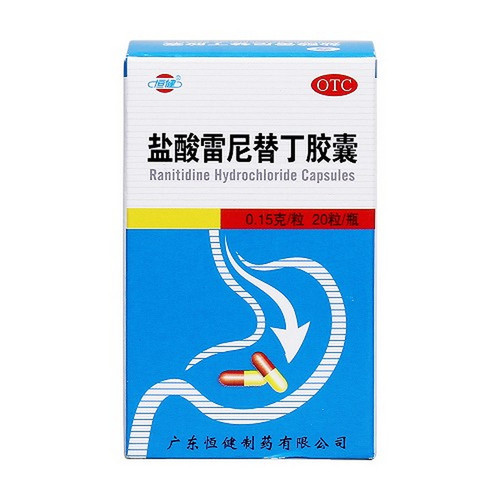Product Overview
[Drug Name]
Generic Name: Ranitidine Hydrochloride Capsules
Trade Name: YiShu Ranitidine Hydrochloride Capsules, 20 Capsules
Pinyin Code: YiShu YanSuanLeiNiTiDingJiaoNang 20Li
[Main Ingredient]
Ranitidine.
[Indications/Main Functions]
Used to relieve stomach pain, heartburn, and acid reflux caused by excessive gastric acid.
[Specifications]
20 capsules/box (Yishu)
[Dosage and Administration]
Oral. Adults: 1 capsule twice daily. Take in the morning and at bedtime.
[Adverse Reactions]
1. Common side effects include nausea, rash, constipation, fatigue, headache, and dizziness.
2. Compared with cimetidine, adverse effects on renal, gonadal, and central nervous system function are less severe.
3. A small number of patients may experience mild liver damage after taking this medication, but the symptoms disappear and liver function returns to normal after discontinuation of the medication. I suspected this might be a drug allergic reaction, unrelated to the dosage.
4. Long-term use can permanently reduce gastric acidity, facilitating bacterial growth in the stomach, which can reduce nitrates in food to nitrites, forming N-nitroso compounds.
View full text
[Contraindications]
Not suitable for children under 8 years old. Not suitable for pregnant or lactating women.
[Precautions]
1. Patients with suspected cancerous ulcers should obtain a clear diagnosis before use to avoid delaying treatment.
2. It has some liver toxicity, but this condition resolves after discontinuation of the drug.
3. Patients with hepatic impairment and the elderly may occasionally experience disorientation, drowsiness, anxiety, and other mental states after taking this drug.
4. Use with caution in patients with hepatic or renal impairment.
5. Gynecomastia is rare, but its incidence increases with age.
6. It can reduce vitamin B12 absorption. Long-term use can lead to B12 deficiency.
7. Patients with allergies to this product should not use this product.
[Drug Interactions]
1. When used with drugs metabolized by the liver, such as warfarin, lidocaine, diazepam, and propranolol, ranitidine's blood concentration does not increase, leading to toxic side effects.
2. It is safer than cimetidine when used with anticoagulants and antiepileptic drugs.
3. Concomitant use with procainamide may reduce procainamide clearance.
4. It may reduce hepatic blood flow, thus delaying the effects of drugs whose metabolism is significantly affected by hepatic blood flow, such as propranolol and lidocaine.
[Pediatric Use]
This drug is contraindicated in children under 8 years of age.
[Elderly Use]
Due to reduced liver and kidney function in the elderly, the dosage should be adjusted to ensure safety.
[Pregnant and Breastfeeding Use]
This drug is contraindicated in pregnant and breastfeeding women.
[Pharmacology and Toxicology]
Pharmacology: Ranitidine competitively blocks the binding of histamine to H2 receptors. It inhibits gastric acid, with a molar potency 5-12 times that of cimetidine. Therefore, it is a potent H2 receptor blocker.
[Storage]
Store in a dark, sealed, and dry place.
[Expiry Period]
24 months
[Approval Number]
National Medical Product Approval No. H44022805
[Manufacturer]
Guangdong Yishu Pharmaceutical Co., Ltd.









